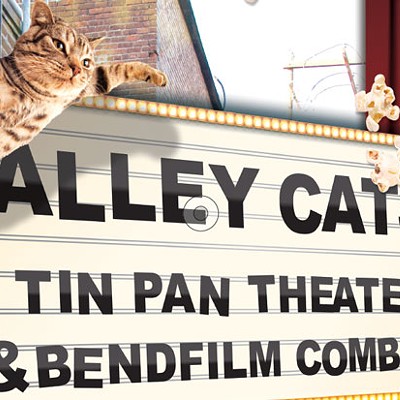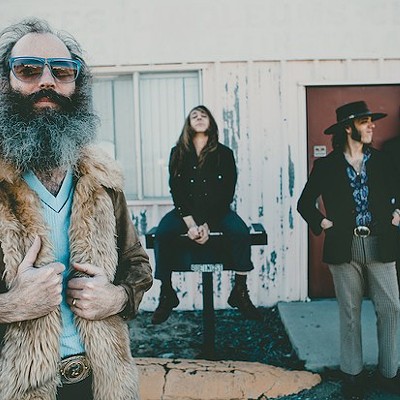Fortunately, finding a quality movie at Bend Film is a lot easier than a needle in a haystack. A lot easier.
Even so, with seven screens simultaneously showing movies, we wouldn't want you to miss out on one of our favorites.
What follows are some of our staff's choices, ranging from "highly recommended," which means this film may just change your life, to "worth watching," which really is not as tepid as it sounds, but truly means you should go watch this movie!
We also tracked down the directors of some of our favorite films in this year's tenth BendFilm festival to get some insights about how and why they made their movies.
BendFilm Festival
Thursday, Oct. 10 - Sunday, Oct. 13
Various theaters, see bendfilm.org for a complete schedule
***SOUCRE PICKS AND INTERVIEWS***
Recommended: Bare As You Dare
Ian McCluskey, director and editor
Bare As You Dare: Portland's World Naked Bike Ride seems like a departure from some of your other films, which are a lot more serious. Is that a fair assessment?
Bare As You Dare is definitely a "light-hearted" film, which you can tell from the very first opening shot of a guy sitting in his backyard with a bicycle behind him and a chicken in his lap. We had a lot of fun slipping in small jokes, but we never, at any point, wanted to be dismissive or sensational.
My main goal was to convey the authentic spirit of the World Naked Bike Ride. Some viewers feel the rush of enthusiasm of the ride, others feel a bit nostalgic. Some see it as a portrait of a large-scale social event, and others as a personal account of being brave and trying to form a more positive relationship with one's body. On character, for example, is a breast cancer survivor, and for her the ride has more reflective spirit.
What made you want to make this movie?
Bare As You Dare was spontaneous. No one had yet done it. At least cohesively. Thousands of spectators had taken snapshots or videos with their cell phones, and the local news stations gave it a snickering wink-wink-poke-poke. But there simply hadn't been a documentary on Portland's World Naked Bike Ride. When we chatted with folks in the bike community, they enthusiastically supported the idea. We'd earned their trust with other films and projects, and they knew NW Documentary wouldn't tell an exploitative, sensational story.
Being given full access to the ride—including media passes, donated pedicabs, and the closely-guarded secret map of the route—we were in a one-of-a-kind position to shot the film. So we rallied all our friends, instructors, volunteers, and alumni, to show up the night of the ride. Positioning them along the route and in the back of pedicabs, we were able to capture a crazy kaleidoscope of footage from the evening.
You do quite a bit of teaching. What is the first —or perhaps most important—lesson you believe you teach your students?
Every story is different. Trust your story. Trust yourself. Be ethical, be honest, be kind. Take creative risks. Make friends along the way.
SHOWING Friday, Oct. 11, 10:30 am Regal Old Mill
Saturday, Oct. 12, 3 pm, Regal Old Mill
Worth Watching: Before the Spring, After the Fall
When the documentary Before the Spring, After the Fall began filming in 2008, heavy metal music was making resurgence in Cairo, but the government still wasn't embracing the alternative culture. In the opening scene of the film, the baby-faced lead singer of the band Your Prince Harming, Shady Nour, thanks the audience for coming and confirms that the band just wants to follow the rules. Then, he leans off stage to tell his brother Noor, "Mom says to be careful, there are secret police everywhere."
Before the Spring, After the Fall approaches the very core of rock music as rebellion. The documentary follows a young generation of musicians who grew up under the oppressive regime of former president Hosni Mubarak. They struggle to play the heavy music they love in a climate of accusation and oppression. (BB)
SHOWING Friday Oct. 11, 3 pm Cascades Theatrical Company
Highly recommended: Bending Steel
Although there is plenty of flexing and grunting, Bending Steel is a surprisingly soft and intimate story about a 43-year-old New York man who decides to become a sideshow strongman at Coney Island. Certainly there are scenes when the strongmen straighten out horseshoes and, veins bulging, smash nails into pieces of wood (without the use of a hammer). But mostly it is a documentary about a small topic that slyly plays out on massive themes—which is to say that this is an unexpectedly beautiful and touching film about growing up, a movie remarkably wide-reaching in spite of the acutely specific topic and the painfully introverted main character, Chris Schoeck.
What also makes the documentary remarkable is that the director Dave Carroll spent six years as a cinematographer for the "Daily Show with Jon Stewart." And while that TV show is the number one purveyor of irony and sardonic humor, Carroll shows only respect and patient compassion for his main character, which translates to a candid, sincere and uplifting documentary. (PB)
SHOWING Friday, Oct. 11, 3 pm, McMenamins; Saturday, Oct. 12, 1 pm, Regal 2
Ryan Scafuro, producer/co-writer/cinematographer, Bending Steel.
How did you first find out about Chris?
It is a pretty funny story. Dave (the director) and Chris live in the same building in Queens. Dave was down in their common basement doing laundry with his French bulldog, Gizmo. There was a clanging sound and Gizmo ran off around the corner. Dave followed her, and there she was sitting in the storage unit that Chris uses for training. Bent hammers, horseshoes, and all kinds of twisted steel lined the walls. Dave cautiously picked up Gizmo and apologized. Chris said something like, "It's OK, she's just curious" in a somewhat creepy voice. Dave humorously describes it as the moment in a horror film right before an axe drops.
A few weeks later he saw Chris again in the elevator and asked what all of the bent steel was about. Chris explained.
You have spent several years working for the "Daily Show with Jon Stewart." How has that experience informed your filmmaking and storytelling abilities?
Yeah, Dave and I both have been freelance cameramen for the Daily Show for about six years now. I think working in any sort of television medium you learn how to react to what is happening in front of you, and that is also a huge part of documentary filmmaking. You have to anticipate, and react. Timing is also a huge part of it, whether comedy or drama.
What do you like most about the film?
It's so hard to name one thing. Quite a few people did a fantastic job making the film what it is. There is a piece of animation in the film that our colleague Lance Herrington created, which really stands out as a great moment. Our sound designer and mixer Hollis Smith did an unbelievable job with the sound. The mood is fantastic. And our composer Fernando Martinez created a beautiful score. honestly listen to the score once a week. It is great music! All these guys were friends of ours, so it is especially rewarding to see how all of the elements came together in such a magical way.
Any documentary films you can recommend to our readers?
Sure. This year we've had the opportunity to meet some fantastic filmmakers while playing the festival circuit, and have been exposed to some films that we may not have otherwise. Convento is a 2011 film by Jarred Alterman that is stunning. It's about a family that lives in an old convent in Portugal, and one son who creates kinetic sculptures—robots made of bird skeletons and other earthly remains. It's a portrait of a family, and a soft poetic observation of art and life. Highly recommended.
Though not a documentary, Hide Your Smiling Faces by Daniel Carbone is another film that I'd like to recommend. It played at this year's Tribeca Film Festival along with Bending Steel, and is a stunning film. It follows a few adolescent boys as they navigate restlessness and all of those confusing feelings that go along with growing up. It's a perfect arthouse film. Cinematic and impactful.
Any next projects?
I have a few ideas that I'm kicking around but haven't figured out which one I want to commit to yet. This may be stating the obvious, but making a documentary is such a long and involved process that you become emotionally invested in the subject and story. So you have to really want to make the film.
Recommended: The Cold Lands
When Atticus' mother—a Subaru-driving, back-to-the-land hippie—unexpectedly dies, the pensive teenager—who has been raised to be wary of authority—takes to the woods that surround his upstate New York home. At its roots, this is a film about growing up and unexpected relationships, and director Tom Gilroy does a fine job of letting his story slowly unfold. The opening third of the film pulls viewers in, thanks to stunning shots of the Catskills and a tender relationship between a single mother and her son. Moviegoers, however, shouldn't be dissuaded by the slow, dialogue-sparse, Into-the-Wild-esque middle third of the film. Atticus' time alone in the shady woods lets us get to know him that much better. The film really pops in its final third as Atticus (Silas Yelich) meets Carter (Peter Scanavino), a charismatic stoner who, apparently, has a soft spot for runaways. Together, the two boys find strength in companionship and a new path. (JW)
SHOWING Friday, October 11, 5:30 pm, Tower; Saturday, October 12, 5:30 pm, Tin Pan
Worth watching: Farah Goes Bang
The road trip genre is a great one, if not overdone. Consider Easy Rider, The Motorcycle Diaries, National Lampoon's Vacation, and Rain Man. All spectacular films, but dominated by dudes. Aside from Thelma and Louise and Little Miss Sunshine, the women-centric road trip films are few.
Enter Farah Goes Bang, a funny, thoughtful and refreshingly female-fronted road trip film that debuted at New York City's prestigious Tribeca Film Festival in April. The 90-minute movie follows 20-something Farah Mahtab (Nikhol Boosheri) and her two girlfriends as they travel through the Midwest stumping for Sen. John Kerry during the 2004 presidential election. Mostly though, they're looking for a good time and a man who can relieve Farah of her virginity. At Tribeca, sophomore director Meera Menon won an award as a "woman writer or director with a distinctive voice." The prize was well deserved. In Farah, Menon deftly mixes juvenile humor with issues of race, disillusionment and, of course, sex.
The movie is filled with moments that ask the characters, and the audience, to reconsider their stereotypes.
It's nothing mind blowing. Viewers likely won't walk away with a new perspective on life, but Farah wasn't meant for that. It's at times surprisingly smart and guiltily funny. But mostly it's a much-needed female addition to the road trip library. (JW)
SHOWING Friday, Oct. 11, 10:30 am, Regal 2;
Saturday, Oct. 12, 3 pm, Regal 1
Meera Menon and Laura Goode, co-writers/director/producer, Farah Goes Bang
You two have been great friends for years, maybe similar to the trio in Farah Goes Bang?
The plot of the story is less autobiographical than the conversations and the rapport that the trio shares. For example, the conversation Roopa and KJ have outside the gas station about their respective body-hair situations is definitely one that we've had many times. I think there's a tone in the way these girls love each other and show affection for each other— teasing and prodding and pushing out of comfort zones—that's very familiar to our friendship. Certainly the desire to make a lady-buddy movie sprang from the deep camaraderie and love we have for each other. It was so satisfying to see the three lead actresses take up that torch and create a rapport all their own.
Why have women been so underrepresented in road trip films? Really, there are very few—good ones, anyway—with women in the lead roles.
Haven't you seen Crossroads starring Miss Britney Spears?! No, seriously, I do agree with you that there's been a resistance to stories starring women as questers, which is to say, women as adventurers, out on the road with a mission. I think there's a lingering perception in Hollywood that women will see movies about men, but men won't see movies about women—especially when it comes to quester stories. We've gotten the greatest feedback from the men in our audiences about Farah—guys coming up to us and saying how much they appreciated that this was a female-led film that they found hilarious and inclusive. I don't know a single guy in my life who doesn't love Mean Girls. It's time for Hollywood to catch up.
What's up next? Are you two working on anything?
We're working on a lot of things! Our work with Farah is hardly done, though. We're taking the film to a bunch of festivals this fall and hammering out our distribution strategy past that. We're also batting around some ideas about how to adapt my 2011 young adult novel "Sister Mischief" for the big or small screen.
What makes a good film festival?
Big or small, I think any festival that celebrates its filmmakers and makes them feel welcome is great. It's wonderful when festivals take care in choosing their screening venues, recruiting audiences, and planning other events. And obviously free beer is really important.
Recommended: Finding Hillywood
In April 1994, the central African nation of Rwanda was ripped apart by ethnic violence. Over several weeks, more than one million Rwandans were murdered; many hacked to death by machetes. It is one of the most gruesome genocides in world history, and its horror rightfully underscores this entire documentary; yet Finding Hillywood is actually an uplifting film, a raw story about redemption and, more generally, a case-study about exactly how and why film matters—and about an attempt by survivors of the genocide to start a film industry in Rwanda.
A lush and sincere character study of real people trying to deal with massive tragedy is real ways. (PB)
SHOWING Friday, Oct. 11, 12:30 pm, Oxford;
Saturday, Oct. 12, 10:30 am, Regal 2
Highly, highly recommended: Fool's Day
Fool's Day is great comedy, the colorful and clever and bloody sort of film Quentin Tarantino would produce if he directed after-school specials.
A quippy and naughty short story about a prank that goes terribly wrong for an elementary school class (that is, they accidentally blow up their likeable, perky teacher), the short film is funny and tense. Director Cody Blue Snider (as in, yes, son of Twisted Sister's Dee Snider) has produced a true gem—solid from start to finish.
Although some of the visual pranks adopt a Little Rascals mentality, the film stays on the smart side of slapstick. Director Snider populates the film with detailed and textured personalities—caricatures that hold enough earnestness to be both lampooned and loveable; especially Officer O'Donnell, the D.A.R.E. police officer who shows up in the classroom after the accident. As blustering and wonderfully comic as Will Ferrell in the title role of Anchorman, Officer O'Donnell is imminently watchable as a machismo buffoon whose ego swaggers right past any sensibility. (PB)
SHOWING Friday, Oct. 11, 3 pm, Regal 1; Saturday, Oct. 12, 3 pm, Tin Pan
Recommended: Grape
Vineyards are good-looking, so naturally they make fabulous settings for movies. Sideways, A Good Year and Parent Trap are just a few of the many films set in vineyards. Add the short film Grape to the list. Writer and director Daniel Stine uses the scenery to create a haunting, sometimes verging on creepy, but still beautiful setting.
The film follows vineyard owner and professional grump Grayson Delecourt, who is planning to sell his family land including the highly contested "back 40" acres, a plot that has never produced a drinkable wine. Delcourt is joined by Stine who plays Tyler, a young man finding the bottom of every bottle of wine he can on the way to a life altering surgery in New York City. The disheveled Tyler finds himself stranded at Delecourt's vineyard overnight, where he wanders the property in a dream-like trance guided by the heir to the Delecourt vineyard.
The cinematography of a partially abandoned vineyard is a gorgeous and evocative backdrop for the films exploration of mortality. (BB)
SHOWING Friday Oct. 11, 3:30 pm Tin Pan; Saturday Oct. 12, 12:30 pm McMenamins
Worth watching: Hank and Asha
A testament to both modern communication and traditional courtship, Hank and Asha is an endearing romantic story about two budding filmmakers who meet after Asha, a cute young Indian woman studying film in Prague, sends a video to Hank, who is living in New York. It is a believable enough premise: Hank is a 20-something filmmaker whose film has screened at some sort of film festival in Europe, but he didn't attend the event.
After Hank responds to Asha's first inquiry in kind—with a candid video sent back to her—the story is off to the races. Quickly, these exchanges—and the storyline—move past this slightly creepy beginning into a sincere and intimate correspondence. The resulting story is a candid love story, one that is simultaneously intimate and distant, as the characters are carrying on a dialogue without ever really meeting, and one that layers cuteness, vulnerability, loneliness and humor.
Hank and Asha imports some of the "what if" premises of Before Sunrise and the playfulness of Amélie; the result is a sweet, enchanting love story told the way perhaps too many contemporary love stories really are told—by electronic exchanges trying to exact the exchanges of real life. (PB)
SHOWING Friday, Oct. 11, 8:30 pm, Tin Pan; Saturday, Oct. 12, 10 am, McMenamins
Recommended: Herd in Iceland
Although Herd in Iceland creates little tension or drama, it's a beautiful portrait of Iceland's barren, windswept countryside and its storied horses, which have existed on the island without crossbreeding for more than 1,000 years. The 28-minute short focuses on the country's fall roundup, in which scores of hardy Icelandic farmers, all clad in thick woolly sweaters, venture up into the highlands to retrieve the horses from their summer grazing zones. The annual tradition is clearly an important piece of the country's rich history (it's referred to as "one of the best weekends of the year") and is filled with plenty of celebration. Drinking, dancing and even feasting on horse stew—there are no idealized notions about a horse's role here. Regular slaughter is necessary, one farmer points out, otherwise there would not be enough grassland and horses would starve. Such simple, honest, traditional country values are refreshing and part of film's overall appeal. (JW)
SHOWING with Finding Hillywood, Friday, Oct. 11, 12:30 pm, Oxford;
Saturday, Oct. 12, 10:30 am, Regal 2
Highly Recommended: McConkey
Extreme skiing pioneer Shane McConkey, who died skiing in 2009, must have been one of the most filmed athletes of all time. Since boyhood, McConkey, an affable daredevil, was obsessed with taking calculated risks—most of which were captured on camera. Using carefully selected clips, the directors of McConkey expertly match old footage with current interviews that include McConkey's friends, family and peers—as well as his estranged father, an extreme skier in his time—to perfectly capture the innovator's indomitable spirit. Of course the 110-minute McConkey includes plenty of radical big mountain skiing as well as McConkey's well-documented antics: naked skiing, BASE jumping, goofs and gags. (JW)
SHOWING Thurasy, Oct. 10, 8:30 pm, Tower; Friday, Oct. 11, 5:30 pm, Regal 1
Worth Watching: Running Blind
E.J. Scott, a regular-looking guy in his mid-30s, lives in a world of increasing darkness. In 2003, he was diagnosed with choroideremia, a rare degenerative eye disease that causes progressive vision loss. Doctors expect that by age 50 Scott will be totally blind. Frustrated by the lack of research surrounding his disorder, an understandably motivated Scott conceives of a seemingly hair-brained plan: to run 12 marathons in 12 months, all in different states—a noble goal for a guy who looks more like a giant teddy bear than a lithe marathoner. The 30-minute film, which premiered at Mountainfilm in Telluride festival in May, is filled with raw, touching moments—like when an exhausted, but triumphant Scott shouts, "This is the best marathon ever!" at the conclusion of a Las Vegas race. Interesting side note: Scott's beautiful, supportive girlfriend (whom he met online) is actress Deborah Ann Woll, who stars in the hit vampire-TV series "True Blood." (JW)
SHOWING Thursday, Oct. 10, 6 pm, Regal 2; Friday, Oct. 11, 5:30 pm, McMenamins
Recommended: Twenty Million People
Twenty Million People asks: What happens after the first big kiss? After the music swells and the leads finally admit their quirky flaws and their love for each other? With a healthy dosage of jaded cynicism and with a cold-water splash of reality, writer/director/producer and actor Michael Ferrell asks: How it can be that in New York City, a metro area of nearly 20 million, it's nearly impossible to find someone you're genuinely interested in?
The film follows Brian (played by Ferrell), an ironic mustache-hating barista and aspiring filmmaker (definitely no Hugh Grant), who finally meets a girl nearly as apathetic about love as he is—Ashley, a waitress and stand up comedian with an easy-come easy-go sense of relationships (definitely no Julia Roberts). When she disappears into the abyss of New York without so much as a returned text message (see the John Cusack movie Serendipity), Brian enlists the help of his recently heartbroken best buddy and his alcohol-induced imaginary friends—two characters from the last lovesick romantic comedy he watched—who serve as an unattainable standard for the perfect relationship.
Borrowing from the "Friends" and "How I Met Your Mother" model of serial dating in New York City, Twenty Million People attempts to subvert the clichés of the typical romantic comedy while still providing a romantically happy ending. It is a tall order, and one that the film serves up hurriedly, but decently well.
The film generally has good intentions, but loses some of its charm to clichés and overwriting. (BB)
SHOWING Friday, Oct. 11 10 am McMenamins; Saturday Oct. 12, 8 pm, Regal 1
Worth watching: The Signal Hill Speed Run
Mike Horelick and Jon Carnoy, directors
Why was it important to make a film about Hill Street?
The Signal Hill Speed Run took place on Hill Street in the City of Signal Hill, and was the world's first downhill skateboard race and ran annually from 1975 to 1978. When Jon Carnoy (the co-director) and myself learned about the race, that was filled with innovation, daring, and flat-out risk-taking, we knew it was a story that had to be told. It has all the elements of a Hollywood film, with enough humor, bravado, and excitement to please any audience, whether they know anything about skateboarding or not.
Where did you get all of the historical footage in the film?
The quest for footage was one of the biggest challenges of making the feature-length documentary. The contests were shot on Super 8 film, not video, and much has been lost. We spent countless hours on the phone to anyone and everyone at the race. Some crucial footage had even ended up in Australia.
Do you feel like these folks were the pioneers of extreme sports? The start of the X Games?
Most definitely. The racers were not just skateboarders. They were surfers, motorcycle racers and even world hang gliding champions. Even though the term "extreme sports" wasn't yet invented, these skateboarders didn't hold back. What else can you say about somebody conquering a steep drop at 50 miles an hour while standing on a primitive skateboard while on LSD? Many of the racers ended up competing at extreme games like the world's first snowboard contest in 1981 and even winning the Red Bull luge competition in San Francisco despite being over 40 years old!
How have audiences reacted to the film thus far?
The audiences have been great. I think that's because they are surprised at the universal nature of the film. Many ask, why should I see this film, I don't skateboard. I then ask them, do you need to be an expert climber to watch a film about climbing Everest? These racers have amazing stories that we feature in the film. And probably the ones most surprised that they love the film are women. Several women entered the death-defying contest, and their stories are equal, if not even more thrilling, than the stories of the men.
How did you get Ben Harper to narrate?
Ben Harper lives in Santa Monica and is a dedicated skateboarder. We ran into him in a local skate shop, showed him a few scenes, and worked out the courage to say, "would you narrate our film?" He simply answered that he would be honored. Ben's narration is simply perfect for our film. He understands storytelling completely and truly gave it his all.
What makes a good film festival for you as a filmmaker, and will you be answering questions after the screening of your film?
Yes, I (Mike Horelick) will be attending the festival. There is a possibility that a racer or two from the contest will attend, as a few live in Oregon. A good festival for me revolves around the audience.
SHOWING Friday Oct. 11, 8 pm Regal; Saturday Oct. 12, 3 pm Tower
Recommended: Two People He Never Saw
A short with a few recognizable faces, Two People He Never Saw stars Kevin Corrigan (Uncle Eddie on "Grounded for Life") and Nick Sandow (prison counselor Joe Caputo in "Orange is the New Black"). Corrigan also directs the picture based on a short story by early 20th century journalist, John McNutley.
The short's charm is its simplicity. Two men walk through New York, enter a bar, and talk about Christmas. One claims that what he wants for Christmas is to take two people to dinner, a woman who used to live next door to him in a rented room and a man who saved him when he was injured in the war; both of whom he never saw face-to-face.
Soft piano music provides a backdrop to the dialogue, enlightening the characters and wrapping with powerful insight to the smallest of life's details. The acting and storytelling are strong and while nothing much really happens in the film, it delivers.
Showing Friday Oct. 11, 8 pm, Tower;
Saturday Oct. 12, 8 pm, Cascades Theatrical Company
Recommended: When Ali Came to Ireland
Even with a half dozen feature-length documentaries about Muhammad Ali, that is not enough. The man had charisma and, with brute force, moved forward history. He truly is dynamic, fun-spirited and historically significant enough to warrant this many cinematic examinations—if not more.
Joining this canon is When Ali Came to Ireland, an easy going hour long documentary about a single 1972 match that Ali fought in Ireland. Although this fight was little more than a footnote in his career—the film and footage and interviews provide a great deal of depth about his generosity and intelligence.
As imminently watchable as Ali is, the documentary's secondary characters nearly steal the show—in particular, Alvin "Blue" Lewis, a droopy-eyed ex-convict from Detroit who learned to box while in prison and who, after this 1972 fight with Ali has spent the subsequent four decades using boxing as a means to reform street kids. As much as When Ali Came To Ireland is about boxing, ultimately the film is more a tale about two strong-willed black men who withstood the hard punches life landed on them—and about redemption and generosity. (PB)
SHOWING Friday, Oct. 11, 12:30 pm, Tower;
Saturday, Oct. 12, 8:30 pm, Regal 2



























